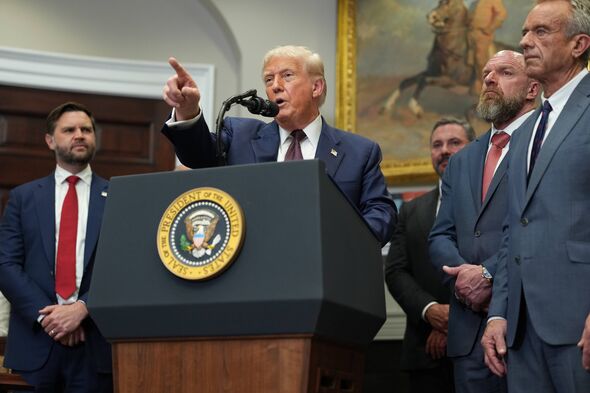Former President Donald Trump has once again injected himself into the ongoing debate surrounding the Washington Commanders’ team name, publicly expressing his disinterest and apparent confusion regarding the current moniker while advocating for a return to its previous, controversial designation.
During recent remarks that also touched upon miscellaneous topics, Trump conspicuously fumbled over the “Commanders” name, questioning its validity aloud. He was quoted asking, “What are they, Commanders or something? Is it Commanders? It’s not a good name,” underscoring his persistent disdain for the team’s current identity.
This latest commentary aligns with Trump’s previously stated position and direct threats concerning the franchise. Just over a week prior, he explicitly threatened to obstruct the team’s proposed $4 billion stadium project unless they reinstated the “Washington Redskins” name, a move that highlights his forceful approach to sports team naming conventions.
The Washington NFL franchise boasts a storied history, originally established as the Boston Redskins in 1932 before relocating to Washington D.C. in 1937. For decades, the team was known as the Washington Redskins, a name deeply ingrained in its legacy and celebrated by a segment of its fanbase.
However, societal shifts and growing awareness led to significant pressure to change the name, which many deemed offensive due to its derogatory connotations towards Native Americans. In 2020, the team responded by adopting the temporary “Washington Football Team” identity, a pivotal step towards addressing public and corporate demands for change.
Subsequently, the franchise officially rebranded as the Washington Commanders, marking a definitive break from its controversial past. This evolution was largely driven by a collective call for greater cultural sensitivity and inclusivity within professional sports, reflecting broader societal values.
The transition was widely lauded by Indigenous communities and advocacy groups. The Navajo Nation, for instance, hailed the name change as a “historic day for all Indigenous peoples around the world,” recognizing it as a crucial stride towards fostering respect for diverse cultures and heritage.
Despite this widely acknowledged progress and the franchise’s concerted effort to align with contemporary social standards, Donald Trump continues to challenge the new identity, championing a return to the former name. His stance reignites a sensitive discourse, positioning his personal preference against a broader movement towards cultural understanding and sports equity.
This ongoing saga highlights the complex interplay between sports, politics, and cultural identity, demonstrating how deeply ingrained symbols can become subjects of intense public and political contention, far beyond the confines of the football field.





Leave a Reply